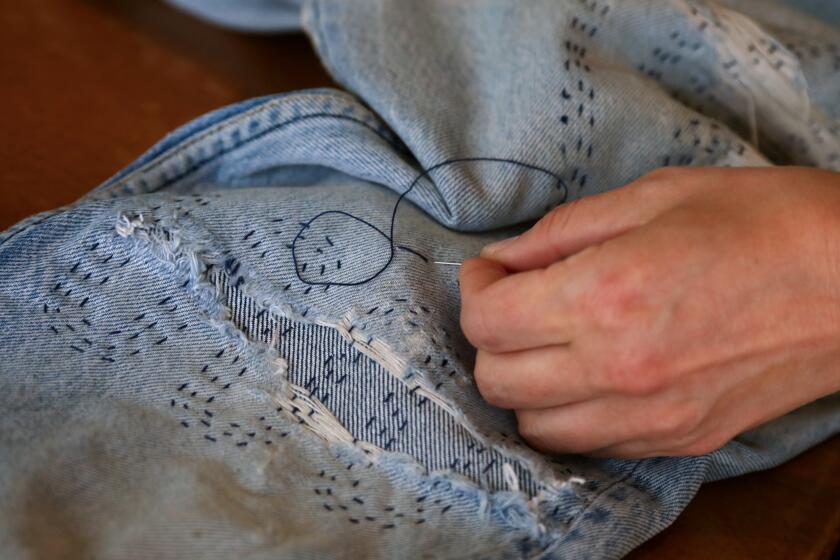Wet Seal Seeks to Control Ex-Exec
Wet Seal Inc., which has spent the last two years trying to regain its footing, will turn to a Superior Court judge today for a hand.
The retailer is scheduled to ask the judge to protect its trade secrets and help stem the flow of employees to a rival chain-store operator.
Certainly, Wet Seal needs an assist. The company, based in Foothill Ranch, is in one of the most turbulent segments of retailing: Selling clothes to trend-hungry teenage girls and young women. But it contends that it’s had to put up with more than the usual apparel trade tussles.
The source of its extra hardship, according to Wet Seal: Greg Scott, the former president of its Arden B. division who became president and chief executive of competitor Bebe Stores Inc. earlier this year.
In a lawsuit filed in February, Wet Seal accuses Scott and Bebe Stores of wooing key employees from Arden B., which is Wet Seal’s most successful chain-store division. The suit contends that Bebe Stores raided Arden B.’s staff by, among other things, tempting workers with higher compensation by using competitive information that Scott would have known as a former Wet Seal executive.
In March, the court granted Wet Seal’s request for a temporary restraining order against Scott, prohibiting him from soliciting its workers or disclosing Wet Seal’s trade secrets. The retailer’s goal for today’s hearing is to have that protection extended until the case is tried or settled.
The lawsuit shines a spotlight on the perils of doing business in the young women’s clothing market. Specialty apparel chains have to hustle to detect fashion whims and then try to keep their strategies cloaked until they unveil new merchandise.
With stores always preparing for the next season, it can be a blow when they lose in-the-loop employees who are part of the planning process. The difficulties are intensified in California because so-called noncompete agreements -- intended to keep key employees from switching from one company to a competing firm -- aren’t generally enforced here, according to intellectual property experts.
“I think it’s the position of California to encourage competition because the view is that competition is better for everyone,” said Antonio Sarabia, a lawyer who specializes in apparel industry intellectual property.
According to Wet Seal’s lawsuit, former Arden B. employees who have left the division to work at Bebe include the vice president of production and design, two other design team members and a former project manager. All had access to important information regarding Arden B.’s designs and customer profiles, the company claims.
It’s not unusual for key retail employees to switch firms. Indeed, Scott was Bebe’s vice president of merchandise from 1996 to 2000 before taking the post at Wet Seal. Before that, he was president of Laundry by Shelli Segal, a division of Liz Claiborne Inc. He also held merchandising positions at Ann Taylor, Henri Bendel and Macy’s West.
Former Wet Seal Chief Executive Kathy Bronstein, who hired Scott before losing her job during Wet Seal’s downturn, has said that when she spotted talent that she wanted to hire she “chased them all over town.” Noting Scott’s success at helping to build the Bebe brand, Bronstein said she “hounded” him until he came to work for her.
Some analysts say that what’s different about the Wet Seal-Bebe case is that so many people jumped ship with Scott. The defections were all the more painful because the employees were so intimately involved with the design or selection of Wet Seal’s products.
“The merchandise area is the most critical in all of these companies,” said Dennis Van Zelfden, an analyst with SunTrust Robinson Humphrey. “It was very bad for Wet Seal to lose these people.”
The employee exodus isn’t Wet Seal’s only problem. The company has been struggling since mid-2002 to rebuild sales after falling out of step with the teen girls who shop in its namesake chain of 475 stores.
The retailer lost $47.3 million in the fiscal year ended Jan. 31, compared with a profit of $4.2 million in the prior year. In March, Wet Seal logged its 21st-consecutive month of same-store sales declines. These sales are a key barometer of a retailer’s health because they include only stores open at least a year. By the end of April, it plans to close its 31-store Zutopia chain that catered to preteen girls.
Wet Seal’s stock, which closed Thursday at $7.91 on Nasdaq, has lost about 10% in the last year. (U.S. financial markets were closed Friday. )
Last month, Chief Executive Peter Whitford, calling the company’s performance “unacceptable,” asked for Wall Street’s patience as the company attempts to turn itself around.
By contrast, Bebe, which has its headquarters in Brisbane, Calif., has been on an upswing. In its fiscal second-quarter ended Dec. 31, the company’s earnings jumped 28.7% to $13.9 million. Same-store sales soared 21% in March, Bebe’s 15th-consecutive month of positive results and twice what analysts were expecting.
Bebe shares have more than doubled in the last year. They closed Thursday at $33.21 on Nasdaq.
As Wet Seal continued to slide -- largely because of problems in the namesake division -- Arden B. glowed. The chain of 99 stores caters to young women with its pricier and more sophisticated offerings, competing directly with Bebe. And, as the division’s president, Scott became Wet Seal’s shining star.
So it was a gut-punch to the company when he bolted in January, after a three-week vacation.
“Greg Scott had turned Arden B. around, and it was doing very, very well,” Van Zelfden said. The company doesn’t break out results for its divisions; it did, however, say that Arden B. accounted for about 20% of total revenue.
The lawsuit, filed in Orange County Superior Court, asserts that Scott was solicited by Bebe and its chief financial officer, Walter Parks, who had been Wet Seal’s chief administrative officer until he resigned in October. When an industry trade paper reported in November that Scott was one of four candidates being considered for the position of Bebe’s president, Wet Seal asked him about it and he denied that he was leaving, the suit says.
When Scott did leave in January, he took “proprietary information,” the suit alleges. It says that during his time at Wet Seal, Scott had access to fashion concepts, designs for future sales seasons, marketing methods, plans for new Arden B. store openings and information about the compensation of other Wet Seal employees.
The other four Arden B. employees left after the trade publication reports and immediately following his resignation, the suit notes.
Neither the executives nor the attorneys on either side returned phone calls seeking comment.
According to the lawsuit, Scott’s employment agreement with Wet Seal prohibited him from soliciting, employing or trying to employ Wet Seal employees for 12 months after his departure from the company. Scott’s leave-taking in and of itself isn’t at issue.
What is, said intellectual property attorney Sarabia, is who made the first move.
“What are these employees going to say, ‘Greg called us or we called Greg?’ ” he said. That “is going to be very important.”






